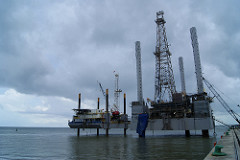Gulf Oil Drilling Downturn Causes Exodus for Idle Rigs
In the aftermath of the BP oil rig explosion and spill, the Obama administration placed a moratorium on oil drilling. Since then, the moratorium may have officially been lifted, but the permitting process for rigs has grinded almost to a halt.
Ten oil rigs have left the Gulf of Mexico in recent months for distant oil fields in South America and Africa. Of the rigs still under contract to operate in the gulf, sixty percent are idle, according to the Financial Times. Idle tug boats, helicopters and other equipment involved in maritime cargo and personnel transfers cost their owners money every day. Others involved in the oyster and shrimp industries still await a positive outcome for claims arising from the BP oil spill.
Some commentators are pointing the finger at the Department of the Interior for mismanagement of the permitting process. Both shallow-water and deepwater permits are tracking well below historical levels.
Oil Rigs Relocating
The lack of drilling activity in the Gulf has caused many oil rigs to leave for greener pastures – rigs are leaving in record numbers for oil fields in South America and Africa. Consequently, U.S. workers on these rigs are also leaving for these foreign waters in an attempt to earn the paycheck their families desperately need.
Tragically, some of the U.S. workers leaving for South America and Africa will be injured on the high seas while drilling for oil. Fortunately though, working outside of U.S. waters does not leave a rig worker without remedies. The Jones Act may allow an American oil rig worker to hold his employer liable for injuries the worker sustains because of the employers negligence.
Generally, injured workers may make claims for personal injury, which can include compensation for lost wages and medical bills. Moreover, the family of a deceased rig worker can bring a wrongful death claim in the unfortunate event that a loved one is killed while working on an oil rig.
If you are an American rig worker, who has been injured while working on an offshore oil rig, whether in United States or international waters, an experienced Maritime attorney can advise you of your rights and options.

